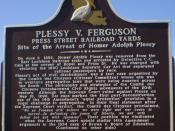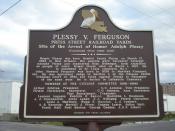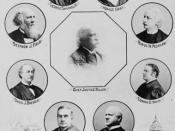Brown vs. Board of Education"In the state of nature...all men are born equal, but they cannot continue in this equality. Society makes them lose it, and they recover it only by the protection of the law." -Charles de Montesquieu (1689-1755)Brown v. Board of The Education of Topeka was a landmark court case of 1954 in which the Supreme Court of the United States unanimously declared that it was unconstitutional to create separate schools for children on the basis of race. The Brown ruling ranks as one of the most historical Supreme Court decisions of the 20th century.
large There were several events and issues which led up to this critical event of Brown vs. Board, one notable case is from 1892 Plessy vs. Ferguson. On June 7, 1892, a 30-year-old black shoemaker named Homer Plessy was jailed for sitting in the "White" car of the East Louisiana Railroad. Plessy was only one-eighths black and seven-eighths white, but under Louisiana law, he was considered black and therefore required to sit in the "Colored" car.
Plessy went to court and argued, in Homer Adolph Plessy v. The State of Louisiana that the Separate Car Act violated the Thirteenth and Fourteenth Amendments to the Constitution. The judge at the trial was John Howard Ferguson, a lawyer from Massachusetts who had previously declared the Separate Car Act "unconstitutional on trains that traveled through several states". In Plessy case, however, he decided that the state could choose to regulate railroad companies that operated only within Louisiana. He found Plessy guilty of refusing to leave the white car. In 1896, the Supreme Court of the United States heard Plessy case and found him guilty once again.
In the early 1950's, racial segregation in public schools was the norm across America. Although all the schools in...


